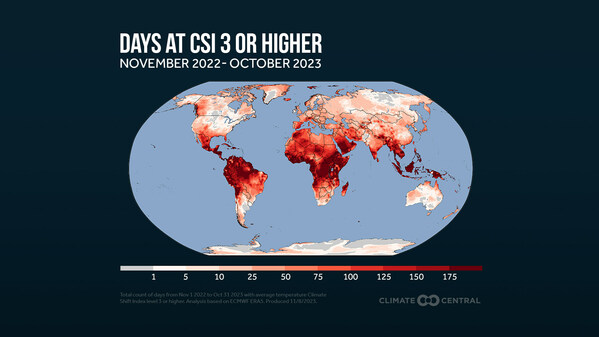Attribution study identifies countries, cities where climate change most influenced temperatures as global warming surpassed 1.3 degrees Celsius above pre-industrial levels
PRINCETON, N.J., Nov. 9, 2023 /PRNewswire/ -- Global temperatures set a new 12-month record, exceeding 1.3 degrees Celsius above pre-industrial levels from November 2022 through October 2023, according to a new analysis of international data released today by Climate Central. This marks the hottest year-long period in recorded history.

In 170 countries, mean temperatures over the span exceeded 30-year norms, exposing 7.8 billion people — 99% of humanity — to above-average warmth. Only Iceland and Lesotho recorded cooler-than-normal temperatures.
Weather attribution analysis reveals that during the span, 5.7 billion people were exposed to at least 30 days of above-average temperatures made at least three times more likely by the influence of climate change, or level-three on Climate Central's Climate Shift Index. That exposure included nearly every resident of Japan, Indonesia, the Philippines, Vietnam, Bangladesh, Iran, Egypt, Ethiopia, Nigeria, Italy, France, Spain, the United Kingdom, Brazil, Mexico, and every Caribbean and Central American nation.
In India, 1.2 billion residents — 86% of the population — experienced Climate Shift Index level-three temperatures on 30 or more days. In China that figure was 513 million residents — 35% of the population; and in the United States, 88 million — 26% of the population – experienced at least 30 days of temperatures made at least three times more likely by climate change.
During this span more than 500 million people in 200 cities experienced streaks of extreme heat, with at least five days of daily temperatures in the 99th percentile compared to 30-year norms. No major city on Earth matched Houston's 22 consecutive days of extreme heat between July 31 and August 21. New Orleans and two Indonesian cities — Jakarta and Tangerang — followed with 17 straight days of extreme heat. Austin (16 days), San Antonio (15 days), and Dallas (14 days) were also among the cities with the longest extreme heat streaks. In each of these cities, on every day of these streaks, the Climate Shift Index reached the maximum level-five, indicating that climate change made this extreme heat at least five times more likely.
"This 12-month record is exactly what we expect from a global climate fueled by carbon pollution," Dr. Andrew Pershing, vice president for science at Climate Central said. "Records will continue to fall next year, especially as the growing El Niño begins to take hold, exposing billions to unusual heat. While climate impacts are most acute in developing countries near the equator, seeing climate-fueled streaks of extreme heat in the U.S., India, Japan, and Europe underscores that no one is safe from climate change."
A summary of the analysis, with complete source data and localized graphics from Climate Central's Climate Matters program is available at: https://www.climatecentral.org/climate-matters/earths-hottest-12-month-streak-2023
Contact: Peter Girard, Vice President of Communications, Climate Central: pgirard@climatecentral.org or +1-609-986-1999
About Climate Central
Climate Central is a non-advocacy, non-profit science and news organization providing authoritative information to help the public and policymakers make sound decisions about climate and energy.